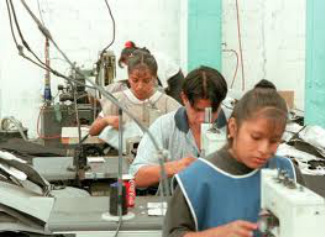 Tags: capitalism, commodification, corporations, economic sociology, globalization, inequality, marx/marxism, organizations/occupations/work, capital flight, feminization of poverty, maquiladoras, world-systems theory, 00 to 05 mins Year: 2006; 2012 Length: 4:04; 2:58 Access: clip 1 on YouTube; clip 2 at the New York Times Summary: These two clips examine the role of low wage work in the global economy. The first clip looks at maquiladoras (multinationally-owned factories operating in tax-free zones in low wage countries) from the documentary Maquilapolis (city of factories). It presents the stories of two female maquiladora workers. Carmen works the graveyard shift at a factory that produces television parts. She was attracted to the maquiladoras because it paid better wages than the rest of Mexico. However, she ultimately suffers from kidney damage and lead poisoning from her years of exposure to toxic chemicals and her employers that do not allow workers to drink water or go to the bathroom during their shift. In a global economy, corporations are attracted to places like Mexico because of their tax-free zones that offer tax breaks and cheap labor that is easily exploitable. Employers expect labor, which is mostly female, to have "agile hands and would be cheap and docile". Ultimately, Carmen's employer moved from Mexico to Indonesia to find cheaper labor and earn higher profits. The clip discusses female labor as a "cheap commodity" that is easily discarded if they become less productive or defend their labor rights. The second clip documents workers at a Chinese Foxconn factory that employs 120,000 workers with low pay and dangerous working conditions. The clips offer a good illustration of world-systems theory, and viewers can be encouraged to think about the role of maquiladoras in the global economy. How does value flow through the global economy? How is work, gender, and inequality linked to maquiladoras and the mobility of transnational corporations around the world? Do maquiladoras reproduce poverty or can they help nations rise in global value chains? Submitted By: Paul Dean
3 Comments
ivis
9/17/2015 01:26:12 pm
Reply
Manuel Franco
7/30/2023 12:32:47 pm
I just want to say Thank You to everyone who supported me through the years. My name is Manuel Franco, New Berlin, Wisconsin. My story of how I won the Powerball lottery of $768.4M is a bit of a tale. I have been playing Powerball tickets for 6 years now since I turned 18. I bought my first ticket on my 18 birthday. I was feeling very lucky that day because I had contacted Dr. Odunga Michael to help me with the winning Powerball numbers. I really had that great great feeling that I looked at the camera wanting to wink at it. I only did a tiny part of it and trusted him. He gave me the numbers after I played a couple other tickets along with it for $10. I checked my ticket after the winnings came online and saw the numbers were correct including the Power play. I screamed for about 10 minutes because it felt like a dream. I had won $768.4M. You can check my winning testimony with the lottery officials just with my name search. Thank you Dr Odunga. Well, his email is [email protected] and you can also call or Whats-app him at +2348167159012 so you guys can contact him
Reply
mark hold
7/8/2024 08:45:03 am
Herbal Penis Enlargement product is 100% guaranteed to Enlarge and get a better ERECTION, the reason why most people are finding it difficult to enlarge Penis is that they believe in medical reports, drugs and medical treatment which is not helpful for Penis Enlargement. Natural roots/herbs are the best remedies which can easily Enlarge your Penis permanently Contact Dr MOSES BUBA via Email: [email protected] or via WhatsApp: +2349060529305. for Natural root and herbal remedies put together to help Enlarge manhood and Erect healthily. I also learn that Dr MOSES BUBA also can cure other types of diseases, HEPATITIS B,DIABETICS,CANCER,HPV,LOW SPERM CAM, HIV/STDS, FIBROSIS LOST OF WEIGHT, BREAST ENLARGEMENT, HIPS and BUMS ENLARGEMENT etc .
Reply
Leave a Reply. |
Tags
All
.
Got any videos?
Are you finding useful videos for your classes? Do you have good videos you use in your own classes? Please consider submitting your videos here and helping us build our database!
|
 RSS Feed
RSS Feed
